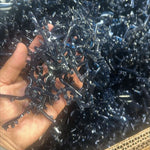Category: Plastic Waste Products
Vendor:Polymer in Stock
Scrap TPE consists of post-industrial or post-consumer thermoplastic elastomer waste generated from manufacturing processes such as extrusion, injection molding, blow molding, and profile production. TPE combines the flexibility and softness of rubber with the recyclability and processability of thermoplastics, making it a valuable secondary raw material. Scrap TPE retains its elastic properties after recycling and can be reprocessed into a wide range of durable and flexible products.
Color – Black
Packaging – Jumbo Bag
Material Composition:
-
100% Thermoplastic Elastomer (can include SBS, SEBS, TPO, TPV grades depending on source)
-
Shore Hardness Range: Typically from 30A to 90A
-
Melting/Softening Temperature: ~160–220°C (varies by grade and formulation)
Physical Characteristics:
-
Form: Lumps, regrinds, pellets, sheets, off-cuts, or defective molded parts
-
Color: Natural, black, or mixed colors
-
Texture: Soft, flexible, and rubber-like with excellent recovery properties
-
Contamination Level: Low (sorted and cleaned; minimal foreign material)
Applications:
Recycled Scrap TPE can be used in:
-
Automotive parts such as seals, gaskets, and trims
-
Grips, handles, and soft-touch consumer goods
-
Footwear soles and straps
-
Cable insulation and sheathing
-
Sports and leisure equipment
-
Industrial seals and vibration-damping components
Advantages:
-
Elastic Performance: Retains flexibility and resilience after recycling
-
Versatility: Can be blended with other polymers for tailored properties
-
Chemical Resistance: Withstands oils, greases, and weathering
-
Eco-Friendly: Diverts waste from landfills and supports circular manufacturing
-
Cost Efficiency: More affordable than virgin TPE without major performance loss
Material Composition:
-
100% Thermoplastic Elastomer (can include SBS, SEBS, TPO, TPV grades depending on source)
-
Shore Hardness Range: Typically from 30A to 90A
-
Melting/Softening Temperature: ~160–220°C (varies by grade and formulation)
Physical Characteristics:
-
Form: Lumps, regrinds, pellets, sheets, off-cuts, or defective molded parts
-
Color: Natural, black, or mixed colors
-
Texture: Soft, flexible, and rubber-like with excellent recovery properties
-
Contamination Level: Low (sorted and cleaned; minimal foreign material)
Applications:
Recycled Scrap TPE can be used in:
-
Automotive parts such as seals, gaskets, and trims
-
Grips, handles, and soft-touch consumer goods
-
Footwear soles and straps
-
Cable insulation and sheathing
-
Sports and leisure equipment
-
Industrial seals and vibration-damping components
Advantages:
-
Elastic Performance: Retains flexibility and resilience after recycling
-
Versatility: Can be blended with other polymers for tailored properties
-
Chemical Resistance: Withstands oils, greases, and weathering
-
Eco-Friendly: Diverts waste from landfills and supports circular manufacturing
-
Cost Efficiency: More affordable than virgin TPE without major performance loss
RECENTLY VIEWED PRODUCTS



 +971 509205838
+971 509205838














